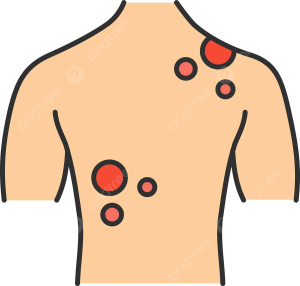Skin Cancer
Skin cancers result from the abnormal proliferation of skin cells, predominantly triggered by prolonged exposure to ultraviolet (UV) radiation from sunlight or tanning beds. UV rays damage the DNA in skin cells, leading to mutations that can initiate cancerous growths. Early detection through regular skin examinations and self-checks is critical as it allows for timely intervention, significantly improving treatment outcomes and prognosis.
At our Cancer Clinic, we are dedicated to providing comprehensive care across every stage of skin cancer management. From initial screening to advanced treatment modalities and supportive therapies, our team of specialists ensures personalized care tailored to each patient’s needs and condition.

Types of Skin Cancers
1. Basal Cell Carcinoma (BCC)
The most common type of skin cancer, accounting for about 80% of cases. It typically develops on areas of the skin exposed to the sun, such as the head, neck, and hands. Despite being slow-growing and highly treatable, especially when detected early, neglecting treatment can lead to disfigurement and more invasive treatment.
Symptoms and Features:
- Pearly or waxy bump
- Flat, flesh-colored or brown scar-like lesion
- Bleeding or scabbing sore that heals and returns
2. Squamous Cell Carcinoma (SCC)
Squamous Cell Carcinoma (SCC) arises from the squamous cells in the outermost layer of the skin. It is usually found on areas exposed to the sun, such as the face, ears, neck, and hands. SCCs can also develop in scars or chronic skin sores. Unlike BCCs, SCCs can grow and spread to other parts of the body, including lymph nodes and organs, if left untreated.
Symptoms and Features:
- Firm, red nodule
- Flat sore with a scaly crust
- Persistent sore that heals and reopens
3. Melanoma
Melanoma is the most dangerous type of skin cancer, originating in the melanocytes—the cells responsible for producing pigment in the skin. Melanomas can develop anywhere on the body, including areas not exposed to the sun. They often arise from existing moles or appear as new pigmented growths.
Symptoms and Features:
- Change in an existing mole or new pigmented growth
- Asymmetrical shape, irregular borders, uneven color
- Large diameter (greater than 6mm) or evolving size, shape, or color
4. Merkel Cell Carcinoma (MCC)
Merkel Cell Carcinoma (MCC) is a rare but aggressive form of skin cancer that develops from Merkel cells, which are involved in the sense of touch. MCC typically occurs on sun-exposed areas in older adults and those with weakened immune systems.
Symptoms and Features:
- Firm, shiny nodule
- Red, pink, or blue lesion
- Fast-growing, painless mass
5. Dermatofibrosarcoma Protuberans (DFSP)
Dermatofibrosarcoma Protuberans (DFSP) is a rare, slow-growing tumor that arises in the deep layers of the skin, typically on the trunk or limbs. DFSP starts as a flesh-colored or purple growth that may become a dome-shaped or button-like nodule over time. Although it rarely spreads to other parts of the body, DFSP has a high recurrence rate after surgical removal. Close monitoring and regular follow-up are necessary to detect and treat recurrent tumors.
Symptoms and Features:
- Flesh-colored or purple growth
- Dome-shaped or button-like nodule
- Tends to recur after surgical removal
Diagnosis Methods
- Skin Examination: Visual inspection to detect changes or abnormalities.
- Dermoscopy: Magnification and light to examine skin lesions closely.
- Skin Biopsy: Removal of a sample for microscopic examination.
- Sentinel Lymph Node Biopsy: Determines if cancer has spread to nearby lymph nodes.
Treatment Options and Procedures
Personalized treatment plans are based on cancer type, stage, and patient health:Surgical Interventions:
Oncologically acceptable cosmetic surgical approaches are employed for skin cancers depending on the locations. Example: Face and Extremities.- Excisional Surgery: Removal of the cancerous tissue and a surrounding margin of healthy skin.
- Mohs Surgery: Layer-by-layer removal of cancerous tissue, ensuring minimal damage to healthy tissue.
- Lymphadenectomy: Surgical removal of lymph nodes affected by cancer.
Non-Surgical Treatments:
- Radiation Therapy: Targets cancer cells with high-energy rays.
- Chemotherapy: Medications to kill cancer cells or stop their growth.
- Immunotherapy: Is currently regarded as the most effective methodology of control of disease in both adjuvant and neoadjuvant settings. Boosts the body’s immune system to fight cancer.
- Targeted Therapy: Drugs targeting specific genes or proteins.
Supportive Therapies:
- Reconstructive Surgery: Restores appearance and function after surgical removal.
- Palliative Care: Manages symptoms and improves quality of life.
- Psychosocial Support: Counseling and therapies to address emotional challenges.
Post-Treatment Support and Outlook
Comprehensive care ensures holistic recovery and well-being:
-
Skin Surveillance: Regular skin checks to monitor for recurrence or new growths.
-
Sun Safety Education: Guidance on UV protection and skin cancer prevention.
-
Nutritional Counseling: Dietary recommendations for healing and overall health.
-
Rehabilitation Services: Physical therapy to restore mobility and function.
Prevention and Early Detection
-
Sun Protection: Use sunscreen (SPF 30+), wear protective clothing, and seek shade during peak hours.
-
Self-Exams: Regularly check your skin for changes in moles, freckles, or growths.
-
Annual Skin Checks: Schedule regular screenings with a dermatologist.
-
Avoid Tanning Beds: Ultraviolet radiation from tanning beds increases skin cancer risk.
Advances in Treatment and Care
Innovative techniques enhance outcomes and patient comfort:
-
Minimally Invasive Surgery: Less scarring and faster recovery times.
-
Targeted Therapies: Tailored treatments based on genetic profiles.
-
Precision Medicine: Personalized approaches to maximize effectiveness.
Take Charge of Your Skin Health
Concerned about skin cancer or seeking expert care? Our dedicated team at the Cancer Clinic provides compassionate, specialized care focused on your unique needs.
Take Charge of Your Skin Health
Concerned about skin cancer or seeking expert care? Our dedicated team at the Cancer Clinic provides compassionate, specialized care focused on your unique needs.
